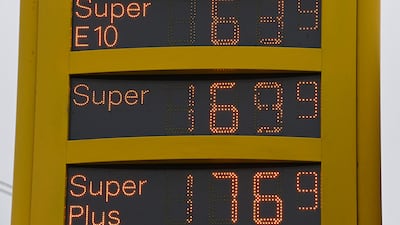Oil prices are poised to continue their ongoing rally after ending the week more than 3 per cent higher following continued shortages in the global economy.
Brent, the international benchmark, gained 3 per cent over the week and settled 1.02 per cent higher at $84.86 per barrel on Friday. West Texas Intermediate, which tracks US crude grades, gained 3.7 per cent for the week and closed 1.2 per cent higher at $82.28 per barrel on Friday.
"We expect high energy prices to continue to dominate media headlines around the world this week and particularly in the US," a consultancy Energy Aspects report said.
"With Brent at $84, a lot of comparisons are being made to 2018, when Brent surged to $86 only to crash below $60 in just two months. But net speculative length is $35 billion lower than in 2018, as many more are long gas, not oil," the report added.
The consultancy sees Opec+, the crude exporters' group headed by Saudi Arabia and Russia, continuing to push for their current plan to return 2 million barrels per day back to the markets.
The group did not waver in its decision to incrementally add 400,000 bpd earlier this month.
Opec+ is under pressure from the Joe Biden administration, which is pressing for more supply to ease the pressure on consumers.
The group has not acquiesced to external pressure and is looking to avoid a repeat of the scenario in 2018, when it increased supply in anticipation of US sanctions against Iran, only to see prices collapse by more than 30 per cent by the end of the year.
Oil's rally comes amid shortages in various parts of the world and skyrocketing prices for gas, which have gained 95.38 per cent on a yearly basis. The fuel, which is critical to meeting electricity generation needs in power plants as well as heating requirements during cold winter months, also increased 1.56 per cent over the past month.
The ongoing energy crisis and record natural gas prices are expected to boost oil demand by 500,000 bpd, according to the monthly oil market analysis released by the International Energy Agency.
Global shortages of natural gas are increasing demand for crude and placing yet more pressure on strained oil supplies, the Paris-based agency said. This, in turn, is helping to feed rising inflation and slow the world's recovery from the Covid-19 pandemic.
The US Energy Information Administration has also forecast natural gas prices to remain elevated through the northern hemisphere winter, marking the highest increase in prices since 2007-08.
"We expect Henry Hub prices will decrease after the first quarter of 2022, as production growth outpaces growth in LNG exports, and will average $4.01 per million British thermal units for the year," it said in a report on Thursday.
Henry Hub prices settled at $5.42 per barrel on Friday.
The IEA cautioned that the world will turn increasingly towards oil amid record coal and gas prices "to keep the lights on and operations humming".
Oanda's analyst Edward Moya noted that the economy can "still handle the current surge in energy prices" backed by strong earnings and economic data.
"The oil market deficit will only get wider as global stockpiles remain at low levels, unexpected demand comes from colder weather, and on surging jet fuel demand as the US opens up international travel," he said.


